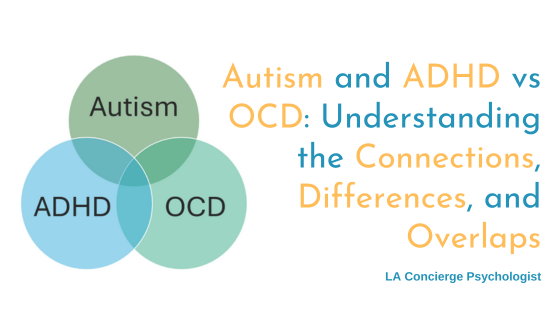Navigating the workplace of a full-time job can be challenging for anyone. There are so many moving parts, it can sometimes feel like an ever-changing obstacle course. For autistic adults, that obstacle course usually involves, well… a lot more obstacles. A major factor in succeeding at work, autistic or not, is to advocate for one’s needs.
The Workplace Needs of Autistic Adults
Of course, every individual (neurotypical or neurodiverse) has their own strengths and areas of support. From my work with autistic adults, I’ve found that most areas of support lie in these general categories:
1. Informed and Sensitive Co-Workers
Above all, my autistic clients thrive at work when they have supervisors and coworkers that understand and embrace neurodiversity. As unfair as it may be, the burden may fall on you to help educate your colleagues. It can be an opportunity for everyone to grow, learn, and thrive. A welcoming workplace for an autistic adult is one in which coworkers:
- Are open to learning about the strengths and needs of autistic colleagues
- Actively accommodate such autistic employee’s needs
- Embrace and celebrate different ways to approach the same job
- Talk and share openly about ways to help everyone thrive in the workplace
- Recognize that each autistic adult is unique and, therefore, cannot be treated with a one-size-fits-all approach
2. Communication and Social Interaction
As a part of employers and colleagues becoming more educated about autistic needs, it’s helpful when they understand things like:
- Just because you’re not looking them directly in the eye, doesn’t mean you’re not listening. In fact, let them know that it helps you focus on what they’re saying!
- You aren’t being rude if you decline an invite to eat lunch with a group of colleagues. It also doesn’t mean that you don’t like them. You may just need some alone time away from people, you don’t have the bandwidth to be in a group setting at the moment, or maybe the restaurant they chose is too loud and overwhelming.
- It can be hard when instructions are unclear; the more concrete details given, the less anxiety-provoking… and the better you’ll perform!
- You get super passionate about things, which may cause you to miss some subtle cues that your boss or coworkers want to switch topics or have to end the conversation. You don’t mean to dominate the conversation or hold them up.
- Sometimes you communicate in non-verbal ways that neurotypical people are unfamiliar with, such as moving your whole body or using your hands and fingers in specific ways.
3. Structure and Routine
Many of my clients also have found that it’s helpful for people to know that:
- You thrive when there’s a predictable schedule or routine to your work day or work flow.
- It helps to have as much advance notice about any necessary changes to your routine.
- You may need some extra time to regulate yourself after a big change or disruption. At this time, patience and understand is appreciate.
4. Sensory Issues
Most of my clients struggle with hyper or hyposensitivity to sensory input. Therefore, it can be helpful for employers and colleagues to know that:
- You may need to stand up and pace during meetings; this is especially true if they’re long. It doesn’t mean you’re not attentive; it actually helps you regulate yourself so you can stay engaged in the meeting.
- Wearing noise cancelling headphones or using sound muffling ear plugs may be necessary to help you be comfortable in the workplace.
- You might need slight adjustments to your office, like changing the lighting or sitting on a bouncy ball instead of an office chair.
- Having access to a “quiet room” where you can comfortably decompress or regulate yourself would be very helpful.
Autistic Adults: How to Effectively Advocate for Yourself at Work
Know thyself in order to advocate for yourself
The first step to self-advocacy is to really reflect and thinking about what your specific areas of need are. Because, if you don’t know where you struggle, how can you ask for support in those areas?
The trick is to be very honest with yourself. This can be scary; no one wants to reflect on all the ways that they’re struggling and seemingly falling short. Just remember that you are doing this exercise to help yourself improve the situation, not to berate yourself into feeling badly about yourself.
And, other times, it may feel impossible to self-reflect. You may feel like you don’t know yourself very well. Or that if you knew what was wrong and how to fix it, you’d have done it already. In those cases, asking your friends and family for ideas and input can be helpful.
How to advocate for your needs with supervisors/bosses
It begins by disclosing your diagnosis. This can feel daunting and isolating, but your employer is required by law to support you and make reasonable accommodations. The more your employer and co-workers know about your needs, the more discussion you can facilitate. Be sure to adhere to the protocol for workplace discussions set forth by your employer and avoid complaining informally to colleagues. And, remember, you should be having a conversation with your supervisor or human resources (HR). This is not a situation where you go in and demand things from your employer.
How to know what is and isn’t appropriate regarding self-advocacy
This is not to say that you should lower your expectations. However, it does help to maintain a realistic perspective about what will be addressed and how quickly. In a societal sense, change usually occurs in small increments. Also, there are limits to what your employer is required to do to, by law, to support you in the workplace. Prioritize your needs and manage them accordingly.
Getting Help From Outside the Workplace
It’s often tough living in a neurotypical world when you’re neurodiverse. That makes it necessary to find and/or create safe spaces for yourself. Therapy is once such place, if you can find a counselor who celebrates neurodiversity. The goal of your sessions should not be to “cure” or “fix” you. Rather, you and your therapist will work as partners to:
- Celebrate your strengths
- Learn how to leverage your strengths
- Problem solve what small changes can be made to help you thrive
- Discover ways for you to appropriately advocate for yourself
Let’s talk about those things together. We specialize in autistic adults, affirm neurodiversity, and will help you plot your path forward. Please read more about our work with autistic adults and send us a message or book a free 20 minute consultation call with Dr. Barajas or Dr. Goldman.



